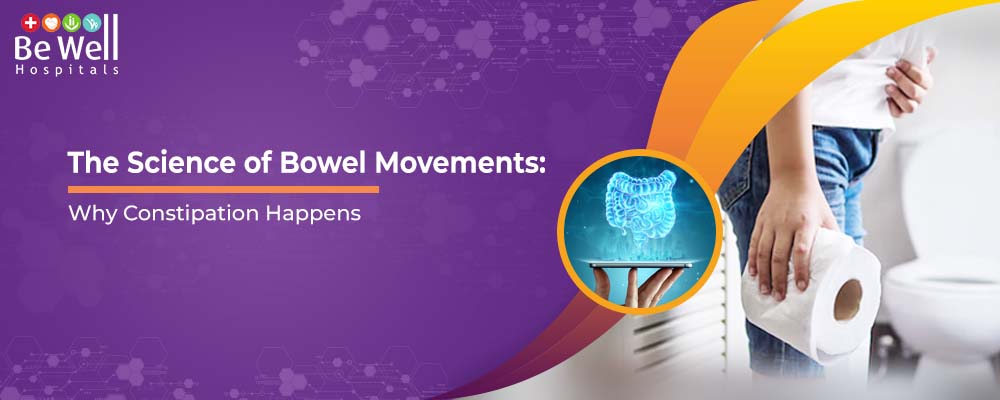The Science of Bowel Movements: Why Constipation Happens

Introduction
Bowel movements are an essential part of our body’s natural processes, playing a vital role in eliminating waste and maintaining overall health. Yet, constipation—a common and often frustrating condition—affects many people at some point in their lives. Understanding constipation is crucial, as it can impact not just physical comfort but also digestive health. This blog delves into the science behind constipation, exploring its causes and the factors that disrupt this critical bodily function. By shedding light on this topic, we aim to equip readers with the knowledge to address and manage constipation effectively.
What is a Normal Bowel Movement?
A healthy bowel movement is often defined by its frequency, consistency, and ease of passage, serving as an important indicator of overall digestive health. For most individuals, the "normal" range can vary from three times a day to three times a week, depending on their unique physiology, diet, and lifestyle. The consistency should ideally be soft but well-formed, allowing for smooth and strain-free elimination. It is essential to recognize that what is "normal" can differ significantly from person to person, highlighting the importance of paying attention to one's body rather than adhering to rigid standards. The digestive system plays a crucial role in regulating bowel movements, as it efficiently processes and absorbs nutrients while ensuring waste is expelled in a timely manner. Understanding these factors is key to maintaining optimal gastrointestinal health and identifying potential issues early.
Understanding Constipation
Constipation is defined as infrequent or difficult bowel movements, often characterized by the inability to pass stools comfortably. It can prompt discomfort and a feeling of incomplete evacuation. While occasional constipation is common and usually temporary, chronic constipation can become a health concern if left unaddressed. Some major signs and symptoms of constipation include:
When constipation becomes persistent or severe, it may indicate underlying health issues such as gastrointestinal disorders, neurological conditions, or issues with diet and lifestyle. It's important to pay attention to these symptoms and seek medical advice if constipation becomes chronic or begins to affect daily life. Early intervention can help prevent complications and improve overall quality of life.
The Role of the Digestive System
The digestive system plays a crucial role in processing food and waste, beginning with the breakdown of food in the stomach and intestines, where nutrients are absorbed. As food moves through the intestines, water and electrolytes are reabsorbed, and the remaining waste becomes more solid. Several factors contribute to promoting regular bowel movements: water helps soften stools, fibre adds bulk, and gut bacteria aid in digestion and regulate intestinal motility. During constipation, the process becomes disrupted. Intestinal motility slows down, leading to harder stools and difficulty in passing waste. This delay can cause discomfort and, if persistent, may lead to more serious health issues. Proper hydration, a fibre-rich diet, and a healthy gut microbiome are essential for maintaining regularity and preventing constipation.
Causes of Constipation
Constipation can be caused by various factors, including dietary, lifestyle, medical, and medication-related influences.
Understanding these causes is essential for managing and preventing constipation effectively.
How Stress and Hormones Affect Bowel Movements
Stress and hormonal changes can significantly impact bowel movements, primarily through the gut-brain connection. When the body is under stress, the nervous system activates a "fight-or-flight" response, which can slow down digestion and result in constipation. Stress hormones, such as cortisol, affect the gastrointestinal system by reducing blood flow to the digestive tract, slowing peristalsis (the contractions that move food through the intestines), and altering the balance of gut bacteria. Hormonal changes during events like pregnancy or menopause can further complicate bowel health. During pregnancy, elevated progesterone levels relax the muscles of the intestines, which can lead to slower digestion and constipation. Similarly, menopause, marked by a decline in oestrogen, can also cause bowel irregularities. These hormonal fluctuations, coupled with stress, can significantly disrupt the normal functioning of the digestive system, leading to digestive discomfort and irregular bowel movements.
Complications of Chronic Constipation
Chronic constipation can lead to several complications that significantly affect health and quality of life:
Conclusion
Understanding the science behind constipation is crucial to addressing the issue effectively. Constipation can result from various factors such as poor diet, sedentary lifestyles, medical conditions, and even stress. By adopting healthy habits like increasing fibre intake, staying hydrated, exercising regularly, and managing stress, individuals can significantly improve their digestive health and prevent or alleviate constipation. However, if constipation becomes a chronic issue or if there are concerning symptoms, seeking medical advice is essential for a proper diagnosis and treatment plan.
At Be Well Hospitals, we encourage you to take charge of your digestive health. For personalized care and expert guidance, visit our Gastroenterology department at Be Well Hospitals or call 9698 300 300 to book an appointment today.
